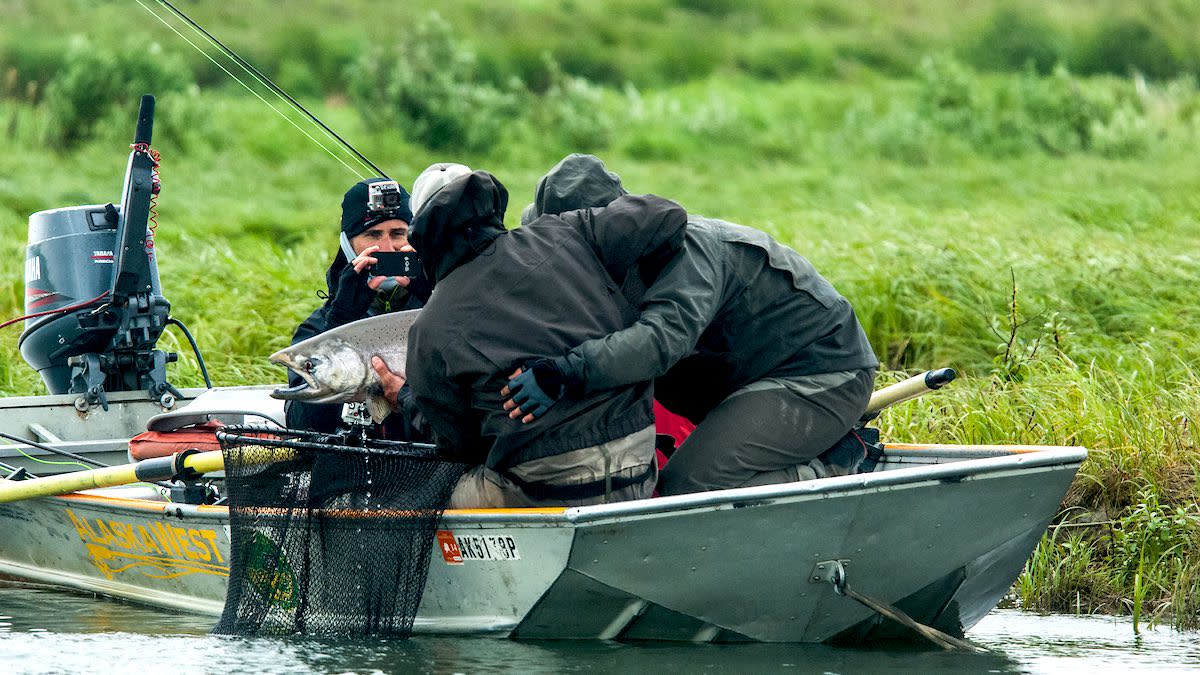Pebble Mine Permit Denied, Conservationists Seek to Bury it Forever

The fiercely contested Pebble Mine will not receive a critical federal permit, the U.S. Army Corps of Engineers announced on Wednesday. This action likely strikes a death blow to the contentious copper and gold project proposed for the Bristol Bay region of Southwest Alaska, but conservationists have vowed to make sure it never rises again.
“USACE determined that the applicant’s plan for the discharge of fill material does not comply with Clean Water Act guidelines and concluded that the proposed project is contrary to the public interest,” the federal agency stated. “This action is based on all available facts and complies with existing laws and regulations. It reflects a regulatory process that is fair, flexible and balanced. USACE is committed to maintaining and restoring the nation’s aquatic resources, while allowing reasonable development.”
Announced shortly after the stock market closed on short day of trading, this permit denial formally prevents the Pebble Partnership and its parent Northern Dynasty Minerals from moving forward on the project at the headwaters of the Kvichak and Nushagak rivers that they have pursued for two decades. Opposition to their plans has unified hunters, anglers, conservationists, environmentalists, tribes, commercial fishermen, and Americans across the political spectrum, with even Donald Trump Jr. and Tucker Carlson publicly declaring their dissent.
In late August, the Army Corps rejected the Pebble Partnership’s first dredge-and-fill application under the Clean Water Act, citing major concerns that the project “would likely result in significant degradation of the environment and would likely result in significant adverse effects on the aquatic system or human environment.” The developers had 90 days to address those concerns and submit a new, better plan.
However, in the meantime, the nonprofit Environmental Investigations Agency caught Ronald Thiessen and Tom Collier, CEOs of Northern Dynasty and Pebble Partnership respectively, on camera contradicting their congressional testimony and official permit plans. While they had publicly promised that the mine would only last about 20 years and create a minimal footprint, to investigators posing as investors they described a wildly different scenario in which the mine would last more like 200 years and sprawl out into a massive mining district covering much of western Alaska—most of which remains untrammeled wilderness. They also bragged about their influence and pull with the Army Corps, Alaska Sens. Murkowski and Sullivan, Alaska Gov. Dunleavy, and even President Trump. Collier resigned in the wake of the Pebble Tapes release.
While conservationists are overjoyed by this news, many have committed to continue fighting until mining is permanently banned in this wild, pristine location.
“Sometimes a project is so bad, so indefensible, that the politics fall to the wayside and we get the right decision. That is what happened today,” said Tim Bristol, executive director of SalmonState. “But denial of a permit does not mean Bristol Bay is safe from the threat of the Pebble Mine. The critical next step is to reestablish the Clean Water Act protections for America’s greatest salmon fishery—protections that should have never been done away with in the first place. This can and should be an early priority for the Biden Administration.”
In 2014, the Obama Administration’s EPA released a damning assessment of potential mining impacts on salmon ecosystems in Bristol Bay. The analysis recommended a permanent veto of the project under section 404(c) of the Clean Water Act. The Trump Administration undid that finding but declined to repeal the assessment altogether. The current EPA and Army Corps allowed Pebble to proceed all the way to the final lynchpin permit, then rejected their application.
Ariel Wittenberg, a reporter for E&E News covering Pebble, tweeted an important reminder: “An Army Corps permit denial is not the same as an EPA veto. It is more easily reversed, if the project changes in anyway they can reapply etc.”
The conservation community has signaled their commitment to maintain the drumbeat demanding permanent protection of Bristol Bay.
“The Corps’ denial of the permit for the Pebble Mine is a victory for common sense,” said Chris Wood, president and CEO of Trout Unlimited. “Bristol Bay is the wrong place for industrial-scale mining, and we look forward to working with the people of the Bristol Bay region, Alaska’s Congressional delegation, the state, and other partners to permanently protect Bristol Bay and its world class fisheries.”
Miles Nolte, MeatEater’s director of fishing, co-host of the Bent Podcast, and a former Bristol Bay-area fly fishing guide, joined the chorus showing optimism for the future of southwest Alaska.
“This can only be hailed as an excellent reason to give thanks at a time when we are all looking for ways to express gratitude,” he said. “This was the wrong mine in the wrong place, and I could not be happier to finally see this 15-year effort come to an end. I hope this means that those fisheries and that ecosystem can remain as healthy and productive generations from now as they are today.”
Feature image by Tosh Brown.



